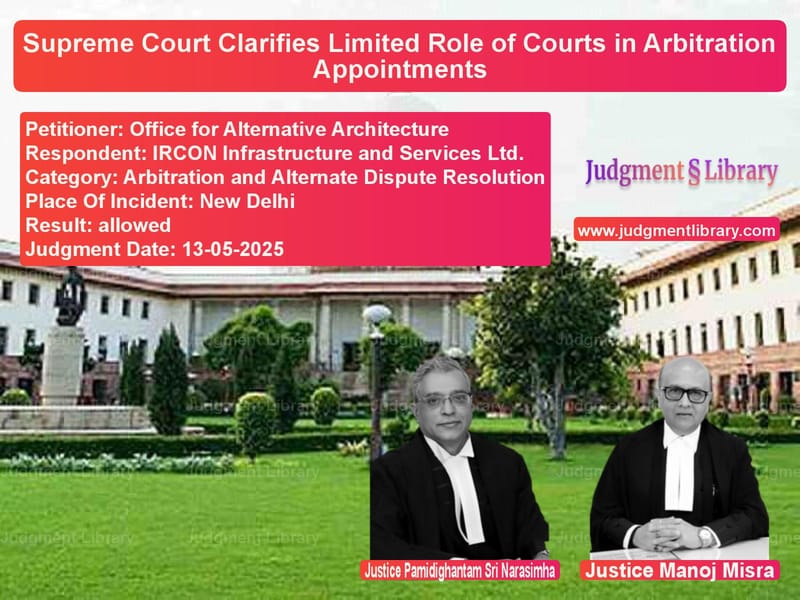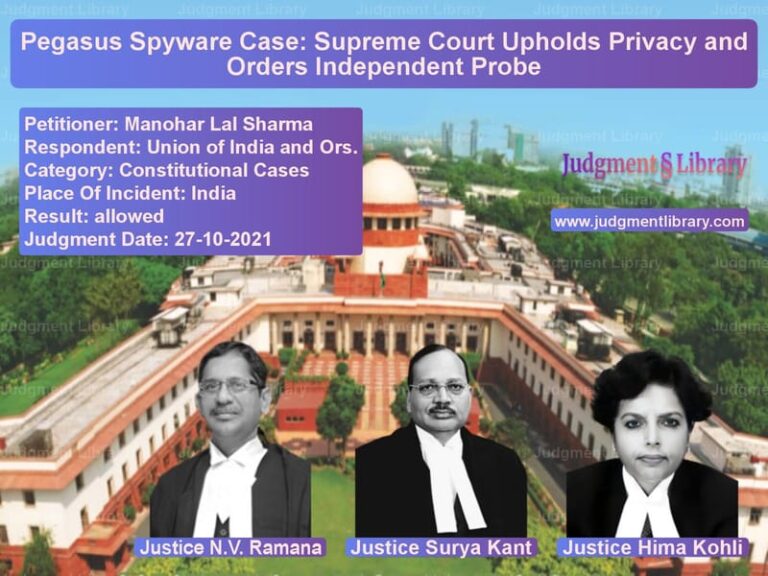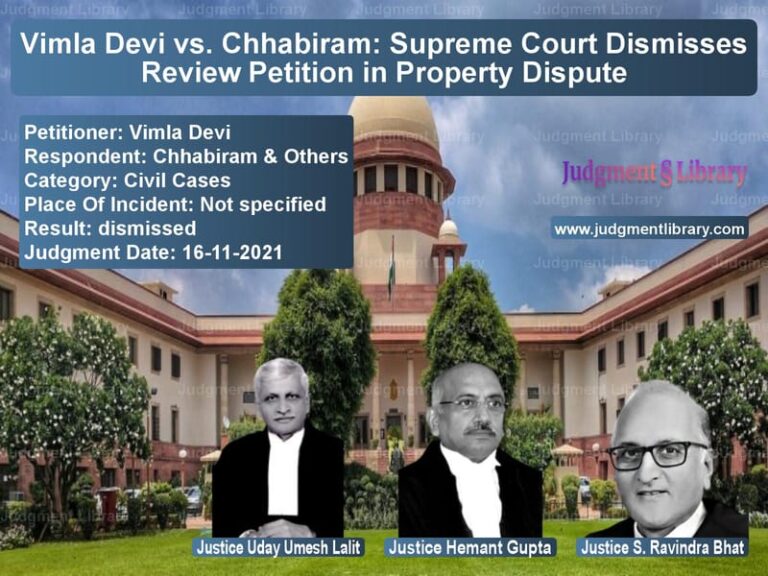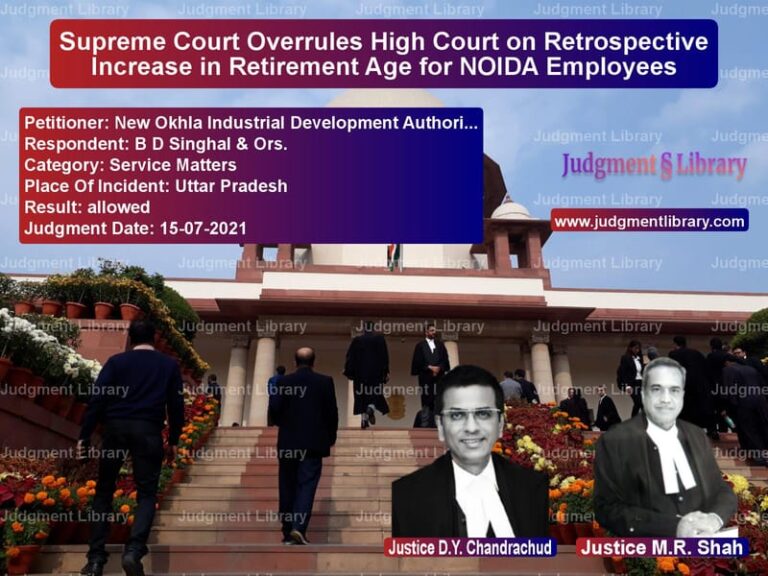Supreme Court Clarifies Limited Role of Courts in Arbitration Appointments
In a significant ruling that reinforces the principle of minimal judicial intervention in arbitration matters, the Supreme Court of India has delivered a crucial judgment clarifying the limited scope of courts when appointing arbitrators. The case between Office for Alternative Architecture and IRCON Infrastructure and Services Ltd. centered on a fundamental question: how much can courts examine when asked to appoint an arbitrator under Section 11 of the Arbitration and Conciliation Act, 1996?
The dispute began when Office for Alternative Architecture approached the Delhi High Court seeking appointment of an arbitral tribunal to resolve their claims against IRCON Infrastructure and Services Ltd. While the High Court did appoint the tribunal, it took the additional step of excluding certain claims mentioned in paragraphs 48 (ii), (iii) and (iv) of the claim petition. The High Court held these claims to be non-arbitrable or ‘excepted matters’ based on clauses 50 and 50.2 of the agreement between the parties. This decision to ‘bisect’ the claims became the central issue before the Supreme Court.
The appellant, Office for Alternative Architecture, argued vehemently against this approach. Their core argument was straightforward: “while exercising power under Section 11 of the 1996 Act, the Court has to only examine whether the arbitration agreement exists or not and if it exists, an Arbitrator is to be appointed who, thereafter, would decide whether the claims fall within the excepted category or not.” They contended that the High Court had overstepped its jurisdiction by deciding which claims were arbitrable and which were not, a function that properly belonged to the arbitral tribunal itself.
On the other side, IRCON Infrastructure and Services Ltd. defended the High Court’s approach. Their counsel submitted that “the High Court is empowered to exclude non-arbitrable claims in light of the decision of this Court in ‘Emaar India Limited vs. Tarun Aggarwal Projects LLP and Anr.'” They relied on this precedent to argue that courts do have the power to weed out non-arbitrable claims even at the appointment stage.
The Supreme Court bench comprising Justices Pamidighantam Sri Narasimha and Manoj Misra had to resolve this conflict between judicial efficiency and the principle of minimal intervention. The court identified the core legal question as: “whether while exercising power under Section 11 of the 1996 Act, the Court has to confine its consideration as to the existence of an arbitration agreement between the parties. If so, whether it would be permissible, while exercising jurisdiction under Section 11, to hold that some of the claims raised are non-arbitrable or fall within excepted category.”
The court’s analysis began with a close examination of Section 11(6A) of the Arbitration Act, which was inserted by the 2015 amendment. The provision clearly states that “the Supreme Court or the High Court, as the case may be, shall, notwithstanding any judgment, decree or order of any Court, confine to the examination of the existence of an arbitration agreement.” Although this sub-section was omitted by the 2019 amendment, the court noted that the 2019 Act had not been notified yet, meaning Section 11(6A) remained legally effective.
The court placed significant emphasis on the statement of objects and reasons behind the 2015 amendment, which explicitly stated that courts should “examine the existence of a prima facie arbitration agreement and not other issues.” This legislative intent became crucial to the court’s reasoning.
The judgment extensively referenced the landmark seven-judge bench decision in In Re: Interplay Between Arbitration Agreements under the Arbitration and Conciliation Act, 1996 and the Indian Stamp Act, 1899, where it was observed that “the Supreme Court or High Court at the stage of the appointment of an Arbitrator shall ‘examine the existence of prima facie arbitration agreement and not other issues’. These other issues not only pertain to the validity of the arbitration agreement, but also include any other issues which are a consequence of unnecessary judicial interference in the arbitration proceedings.”
Building on this foundation, the court then examined the three-judge bench decision in SBI General Insurance Co. Ltd. vs. Krish Spinning, which had authoritatively held that “the scope of enquiry at the stage of appointment of Arbitrator is limited to the scrutiny of prima facie existence of the arbitration agreement, and nothing else.” This decision, being from a larger bench and delivered after considering the seven-judge bench ruling, carried greater weight.
The court made it clear that the respondent couldn’t rely on the two-judge bench decision in Emaar India Limited case when contrary views had been expressed by larger benches. The Supreme Court stated unequivocally: “As the above decision has been rendered by a three-Judge bench of this Court after considering the seven-Judge bench decision of this Court in In Re: Interplay (supra), we are of the view that the respondent cannot profit from certain observations made by a two-Judge bench of this Court in Emaar (supra).”
The court found that the High Court had committed a legal error by delving into the arbitrability of specific claims. The Supreme Court held: “In our view, therefore, the High Court fell in error in bisecting the claim of the appellant into two parts, one arbitrable and the other not arbitrable, when it found arbitration agreement to be there for settlement of disputes between the parties.”
The Supreme Court outlined the correct approach that should have been followed: “The correct course for the High Court was to leave it open to the party to raise the issue of non-arbitrability of certain claims before the arbitral tribunal, which, if raised, could be considered and decided by it.”
Accordingly, the Supreme Court allowed the appeal and set aside the part of the High Court’s order that excluded the specified claims. The court clarified that “the parties are, however, at liberty to take the plea of non-arbitrability of certain claims before the arbitral tribunal, which shall decide the same without being prejudice by any observations made in the order of the High Court.”
This judgment represents a significant reinforcement of the arbitration principle that courts should not interfere with the arbitral process unless absolutely necessary. By limiting the court’s role at the appointment stage to merely examining the existence of an arbitration agreement, the Supreme Court has ensured that arbitral tribunals retain their primary jurisdiction to decide all questions of arbitrability and jurisdiction. The ruling strengthens India’s arbitration framework by reducing judicial intervention and promoting the efficiency and autonomy of arbitration proceedings, aligning with the pro-arbitration stance that modern commercial disputes require.
Petitioner Name: Office for Alternative Architecture.Respondent Name: IRCON Infrastructure and Services Ltd..Judgment By: Justice Pamidighantam Sri Narasimha, Justice Manoj Misra.Place Of Incident: New Delhi.Judgment Date: 13-05-2025.Result: allowed.
Don’t miss out on the full details! Download the complete judgment in PDF format below and gain valuable insights instantly!
Download Judgment: office-for-alternati-vs-ircon-infrastructure-supreme-court-of-india-judgment-dated-13-05-2025.pdf
Directly Download Judgment: Directly download this Judgment
See all petitions in Arbitration Act
See all petitions in Commercial Arbitration
See all petitions in Arbitration Awards
See all petitions in Dispute Resolution Mechanisms
See all petitions in Judgment by P.S. Narasimha
See all petitions in Judgment by Manoj Misra
See all petitions in allowed
See all petitions in supreme court of India judgments May 2025
See all petitions in 2025 judgments
See all posts in Arbitration and Alternate Dispute Resolution Category
See all allowed petitions in Arbitration and Alternate Dispute Resolution Category
See all Dismissed petitions in Arbitration and Alternate Dispute Resolution Category
See all partially allowed petitions in Arbitration and Alternate Dispute Resolution Category







